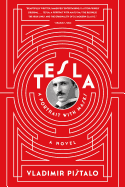
| Publisher: | Graywolf Press | |
| Genre: | General, Fiction, Historical, Literary | |
| ISBN: | 9781555976972 | |
| Pub Date: | January 2015 | |
| Price: | $18 |
| Starred | Fiction |
by Vladimir Pistalo, trans. by Bogdan Rakic, John Jeffries
Modernity wouldn't exist without Nikola Tesla. The Serbo-Croatian scientist invented the alternating-current motor, the basis for the electrical grids that power the world. A romantic, troubled figure, he cast a strange, beguiling shadow over everyone he met, walking through fields of electricity or spouting visionary ideas about transmitting thoughts and dreams via electromagnetic waves. It's no surprise, then, that he's been championed as a mad genius capable of anything.
Vladimir Pistalo's Tesla: A Portrait with Masks (the first of the Serbian writer's works to be translated into English) manages to convey that romanticism without ever getting lost in it. Nominally a novel, the book is more of a biography with some literary flights of fancy. Pistalo faithfully tracks Tesla's youth in modern-day Croatia, his time as a prodigious inventor and man about town in New York City, and his final days as a strange, antiquated figure. Instead of conjecture, Tesla re-creates dreams and conversations as if Tesla were a fictional character (which, by all accounts, was similar to how he acted). But even with the words "a novel" on the front cover, it's hard to avoid reading this book as true to life. Pistalo renders Tesla and his contemporaries so vividly that the line between fact and the author's imaginative powers begins to blend. The novel is perfect for readers looking for better insight into one of the greatest minds of the 19th and early 20th centuries. --Noah Cruickshank, marketing manager, Open Books, Chicago, Ill.
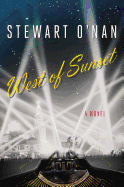
| Publisher: | Viking | |
| Genre: | General, Biographical, Fiction, Historical, Literary | |
| ISBN: | 9780670785957 | |
| Pub Date: | January 2015 | |
| Price: | $27.95 |
| Fiction |
by Stewart O'Nan
"A poor boy from a rich neighborhood, a scholarship kid at boarding school, a Midwesterner in the East, an Easterner out West," F. Scott Fitzgerald "knew better than anyone how to live in an imaginary world." In West of Sunset, Stewart O'Nan (The Odds) fictionalizes Fitzgerald's final four years in the late '30s, spent in Hollywood scraping by, writing and editing screenplays while Zelda rides out her own ups and downs at Highland Hospital. Their years of wealth, fame and adventure are behind them, and though he lives modestly by Hollywood standards, Scott's finances are increasingly desperate, with Zelda's hospital bills to pay, their daughter Scottie's tuition and his own living expenses.
Between pills to sleep and pills to wake up, Scott struggles to hide his heavy drinking from his employers and eventually falls in love. He continues to visit Zelda as her mental illness persists and sees Scottie on holidays, while his girlfriend, Sheilah Graham, barely tolerates his drinking (not to mention his marriage). In these years, Fitzgerald begins but does not finish The Last Tycoon, his last manuscript.
O'Nan brilliantly, sensitively portrays Fitzgerald's internal drama with a tone of wry wit and doom. The nuances of Zelda's character are apt and appropriate, and appearances by Dorothy Parker, Hemingway and Humphrey Bogart add color and humor. O'Nan's characterization and dialogue are spot-on, and his choice of the less-glamorous years of his subject's life yields a beautiful, elegiac novel worthy of its model. --Julia Jenkins, librarian and blogger at pagesofjulia
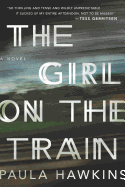
| Publisher: | Riverhead Books | |
| Genre: | Suspense, Crime, Fiction, Thrillers | |
| ISBN: | 9781594633669 | |
| Pub Date: | January 2015 | |
| Price: | $26.95 |
| Mystery & Thriller |
by Paula Hawkins
Rachel is a "soon-to-be-homeless alcoholic" who exists on the periphery of life since her divorce. She pines for and stalks Tom, who lives with his new family in the house he and Rachel used to share. Every day, Rachel rides a train past her old neighborhood, snatching a momentary glimpse into other lives. From this vantage point, she fixates on one couple she often sees, idolizing them: "They're what I lost, they're everything I want to be."
One day, as the train passes the house, Rachel spies the woman kissing a strange man in her backyard. This discovery shatters Rachel's illusions about the "happy" couple, so she binge drinks to the point of blacking out. The following day, when the news reports the woman is missing, Rachel vaguely recalls having exited the train in her old neighborhood that night and subsequently convinces herself that she may be involved. Unfortunately, Rachel can't remember much else--including where and how she received cuts on her hand. Determined to reconstruct the night in question and solve the mystery, she soon becomes entangled in the police investigation.
Paula Hawkins fashions The Girl on the Train from a staggered timeline and three female narrators. Rachel is the anchor, though she's not always understandable or trustworthy; Hawkins fills in the missing pieces via flashbacks and passages narrated by the missing woman and Rachel's ex's new wife. En route to a terrorizing, twisted conclusion, all three women--and the men with whom they share their lives--are forced to dismantle their delusions about others and themselves, their choices and their respective relationships. --Kathleen Gerard, blogger at Reading Between the Lines
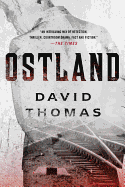
| Publisher: | Quercus | |
| Genre: | Jewish, Fiction, Thrillers, War & Military, Historical | |
| ISBN: | 9781623658496 | |
| Pub Date: | January 2015 | |
| Price: | $26.99 |
| Mystery & Thriller |
by David Thomas
Taking real-life Kriminalpolizei and SS officer Georg Heuser and the events of his life as inspiration for his novel, David Thomas (Blood Relative) tells a chilling story of how a human can devolve from fine, upstanding citizen to heartless killing machine.
Georg Heuser is a young man with strong ambition when he joins the German Criminal Police. He intends to do his job superbly and rise in the ranks accordingly. The first case he investigates--and helps solve--is a high-profile serial murderer. In grotesque irony, Heuser's superiors reward him with a promotion to SS-First Lieutenant and a transfer to Minsk, where his job is to murder helpless Jews as part of the Nazi's "Final Solution."
Though the account is fictionalized, Ostland is no less emotionally challenging than a traditional history. Thomas carefully examines the life of this respectable individual and the forces that enable his transformation to mass murderer. Without exempting Heuser from personal responsibility, Thomas questions the level of his guilt and provokes his readers to do the same.
Ostland alternates between sections told in Heuser's voice during World War II and sections told from the perspective of a pair of criminal trial lawyers 20 years later. The latter include little of the actual legal proceedings and introduce a superfluous affair that temporarily draws focus away from the power of Heuser's story. Despite the slight deviation, Thomas has created a captivating narrative with a high level of suspense and a morally charged theme. This is a horror story told with grace and passion. --Jen Forbus of Jen's Book Thoughts
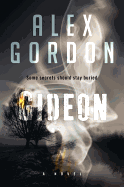
| Publisher: | Harper Voyager | |
| Genre: | General, Fiction, Fantasy, Horror, Paranormal | |
| ISBN: | 9780061687372 | |
| Pub Date: | January 2015 | |
| Price: | $14.99 |
| Science Fiction & Fantasy |
by Alex Gordon
Alex Gordon's debut novel opens in 1836 when the resident witches of Gideon, Ill., governed by their Master and Mistress, have the task of guarding the border between this world and the next, protecting all from the demons that roam on the other side of the boundary. To ward off evil, they perform a ritual killing, burning Nicholas Blaine at the stake, but fail to realize the full implications of his death by fire.
More than 100 years later, in 2015, a former resident of Gideon dies, leaving a mysterious book for his daughter, Lauren. After reading the book, she questions who--and what--her father really was, so she travels to Gideon in search of her father's true identity. What Lauren uncovers as she enters the bleak town where crows refuse to roost and cellphone service is nonexistent stretches the margins of everything she's ever known and believed. She must confront otherworldly beings, the strange townspeople and her own self-doubts if she hopes to survive.
Gideon is filled with supernatural entities that rise from the dead and witches who cast spells on a daily basis, in a place where this world collides with another and even time is in flux. The hierarchy of the characters and the actions they take to protect the Master and Mistress of Gideon bring to mind Shirley Jackson's "The Lottery." Fast paced and filled with lively details, Gordon's prose propels readers into a fantastical world that is haunting to the very end. --Lee E. Cart, freelance writer and book reviewer
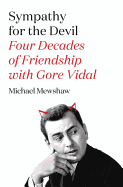
| Publisher: | Bloomsbury | |
| Genre: | Literary Criticism, General, Gay & Lesbian, Biography & Autobiography, American, Literary, Personal Memoirs | |
| ISBN: | 9780374280482 | |
| Pub Date: | January 2015 | |
| Price: | $24 |
| Biography & Memoir |
by Michael Mewshaw
Many are familiar with Gore Vidal thanks to his verbal shoot-outs on TV with William F. Buckley, Jr., and Norman Mailer. Vidal called Buckley a "pro-crypto-Nazi" and Buckley retorted with, "Now listen, you queer." Readers know Vidal through his books, including his outstanding historical novels and Myra Breckinridge. He was an irascible, arrogant, abrasive S.O.B. Michael Mewshaw (Between Terror and Tourism) knew Vidal as a friend for nearly 40 years, and he pays his respects to him in this affectionate, sympathetic biography.
Vidal himself admitted he was a jerk--there's no "warm, lovable person inside... [just] cold water." Mewshaw first met him in Argentina when Vidal was 50. Contrary to popular opinion, he found him easy to talk to and friendly, "generous, hospitable, loyal to friends." Vidal took Mewshaw and his wife out to dinner that night (Gore's longtime companion, Howard Austen, came along) and picked up the tab--he always did. Vidal had an "air of aristocratic self-possession" about him, but Mewshaw also saw Vidal's lifelong generosity, something Vidal never talked about.
Vidal was famous for his opinionated remarks, and Mewshaw cites some great ones: "What are the three saddest words in the English language? Joyce Carol Oates." Mewshaw recounts many stories about his friend hobnobbing with film folk and chronicles Vidal's "slow-motion suicide" brought about by excessive drinking and depression. This "corrective portrait" is a fine rehabilitation of Vidal's legacy, sometimes brutally honest in the telling. --Tom Lavoie, former publisher
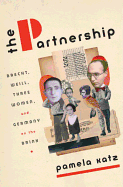
| Publisher: | Talese/Doubleday | |
| Genre: | Art, General, Biography & Autobiography, Entertainment & Performing Arts, Performance, Historical | |
| ISBN: | 9780385534918 | |
| Pub Date: | January 2015 | |
| Price: | $30 |
| Biography & Memoir |
by Pamela Katz
An exhilarating art scene burst forth during the tumultuous Weimar Republic, between the World Wars. The Partnership tells how five brilliant young theater artists came together in this high-stakes period to conceive revolutionary ideas and methods that would shape their later careers and achieve lasting international influence.
The Partnership hinges on the chaotic creation of The Threepenny Opera. Screenwriter, novelist and New York University professor Pamela Katz (who wrote the screenplay for Hannah Arendt) narrates the creative conflicts, financial and political pressures and uproarious clashes of egos that threatened disaster right up to opening night. Katz highlights the relationship between playwright Bertolt Brecht and composer Kurt Weill, but also paints strong portraits of their three gifted and enterprising collaborators--Elisabeth Hauptmann, Lotte Lenya and Helene Weigel--with respect for their achievements and the unconventional terms of their relationships.
She emphasizes that, despite their widely differing backgrounds and personalities, collaboration was a fundamental value for these artists, and their initial successes arose from their creative interdependence. But as Germany swung fatally to the right, and their community disintegrated and fled into exile, Brecht and Weill diverged in their political and artistic priorities, fell into territorial battles and went their separate ways.
Katz's account shifts between scholarly analysis and vivid, almost fictionalized scenes, peppered with idiosyncratic observations (and occasionally flawed by repetition). Nonetheless, her storytelling is powerful and grounded in thorough research. Her technical and cultural expertise and her personal experience with artistic collaboration are evident in her nuanced examination of the work lives and relationships of her controversial subjects. --Sara Catterall
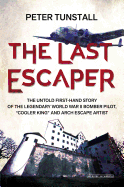
| Publisher: | Overlook Press | |
| Genre: | History, Biography & Autobiography, World War II, Military, Personal Memoirs | |
| ISBN: | 9781468310559 | |
| Pub Date: | January 2015 | |
| Price: | $27.95 |
| Biography & Memoir |
by Peter Tunstall
The Second World War is passing from living memory into history. The number of living veterans, who are now in their 90s, is dwindling. Each one of their first-hand accounts is a precious limited resource, a distinct view on pivotal historical events and human endurance under extreme adversity. Luckily, Royal Air Force bomber pilot Peter Tunstall was able to chronicle his experience as a prisoner of war in Germany before he died at age 94 in 2013.
Tunstall was already an RAF officer by the time Britain declared war on Germany in 1939. He completed only a handful of bombing missions before he was forced to land on the German-occupied Dutch coast in August 1940. Though Tunstall spent the rest of the war as a POW, he never stopped trying to escape or, when that proved impossible, making life as difficult as possible for his captors. His first escape attempt involved an ingenious combination of disguise and distraction, a ruse later referred to by other British prisoners as "doing a Tunstall." The attempt failed only after a policeman in a German port city found Tunstall's cover story (a Swedish fisherman robbed of his identity papers) unconvincing.
Tunstall's attempts grew exponentially more complicated and daring until he was finally transferred to the "escape-proof" prison at Colditz Castle, where he earned the nickname "cooler king" for his many punitive stints in solitary confinement. Tunstall's story is often exhilarating and even funny, though the game he played had deadly consequences (using fake German uniforms nearly got him executed more than once). --Tobias Mutter, freelance reviewer

| Publisher: | New Press | |
| Genre: | Weapons, Political, History, Ethics & Moral Philosophy, Philosophy, Military | |
| ISBN: | 9781595589750 | |
| Pub Date: | January 2015 | |
| Price: | $26.95 |
| Starred | Current Events & Issues |
by Gregoire Chamayou, trans. by Janet Lloyd
Drone warfare carries a number of implications across political, social, military and cultural spheres. Despite the United States' increased use of drones for targeted killings (or assassinations or murders, depending on your persuasion), and more countries and domestic organizations eager to follow suit, Gregoire Chamayou (Manhunts: A Philosophical History) argues that substantial analysis of these implications from a philosophical perspective is lacking.
Chamayou seeks to deconstruct every positive articulation made by those in the pro-drone camp and to demonstrate that drone advocates are either intellectually dishonest, intentionally obfuscating the realities of their weapons, misinformed or naïve. In revealing the flawed reasoning put forth by proponents of drones--such as false dichotomies (claims that drones are more precise than carpet bombing, as if carpet bombing is the option that would be employed otherwise) and category errors (proponents call drones a more humane or humanitarian weapon, but nothing that is designed to kill can be truly humane)--Chamayou dismantles the notion that drones are a fully positive development for society. His argument that the drone violates all standards of Just War theory is particularly poignant as he notes that this technology shifts the focus of our society from ethics (living and dying well) to what he terms necroethics (killing well).
A Theory of the Drone, while challenging in its propositions, is necessary and compelling, as these pilotless aircraft are gradually becoming normalized. --Evan M. Anderson, collection development librarian, Kirkendall Public Library, Ankeny, Iowa

| Publisher: | Bloomsbury | |
| Genre: | Health & Fitness, Health Care Issues, Terminal Care, Death & Dying, Social Science, Medical | |
| ISBN: | 9781620408544 | |
| Pub Date: | January 2015 | |
| Price: | $26 |
| Health & Medicine |
by Angelo Volandes
In The Conversation: A Revolutionary Plan for End-of-Life Care, experienced physician Angelo Volandes focuses on the extensive, intensive, intrusive medical interventions that patients routinely receive at the end of life, many of which extend life by a matter of hours or days or not at all, while decreasing its quality substantially. He earnestly argues that every patient should be offered the option to choose among three broad categories of care: life-prolonging, limited medical and comfort care--in other words, the choice between quantity and quality of life. The Conversation advocates for all patients and families to receive information about what end-of-life care looks like within these three categories, and firmly states the importance of patients, families and medical professionals having what he calls the Conversation about end-of-life wishes openly and often.
The majority of the book is devoted to stories of patients, families and circumstances--and Volandes's own attempts, good and bad, at approaching the Conversation. With names changed, these are real-life anecdotes of choices made with more or less preparation and knowledge of what a decision will entail, or what an incapacitated patient would have wanted. The last quarter of the book is composed of several appendices and a narrative notes section that provide substantive advice for the patient or the patient's spouse or children. The Conversation is a how-to manual, enlivened by engaging--if occasionally painful--true stories. Volandes makes his points succinctly and convincingly and offers readers the tools to make change within their own lives. --Julia Jenkins, librarian and blogger at pagesofjulia
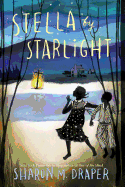
| Publisher: | Atheneum/S&S | |
| Genre: | Prejudice & Racism, Social Issues, Juvenile Fiction, Historical, New Experience, United States - 20th Century | |
| ISBN: | 9781442494978 | |
| Pub Date: | January 2015 | |
| Price: | $16.99 |
| Starred | Children's & Young Adult |
by Sharon M. Draper
Sharon Draper (Out of My Mind) sets her suspenseful, hope-filled story in a small segregated North Carolina town at the time of the 1932 presidential election between Herbert Hoover and Franklin Delano Roosevelt.
In the opening scene, 11-year-old Stella and her eight-year-old brother, Jojo, witness a wooden cross burning on the other side of Kilkenny Pond. "Nine robed figures dressed all in white. Heads covered with softly pointed hoods," the author begins. "Who are they?" Jojo asks. " 'The Klan.' Just saying those words made Stella's lip quiver." Draper gives young readers enough information to place the events in context. The threat is real, but the love and safety Stella finds with her family and the warm community on her side of Bumblebee, N.C., provides the antidote. The KKK, dormant for roughly three years, is showing itself because of the upcoming election. Only Stella's father, Pastor Patton and Mr. Spencer are brave enough to register to vote. And when the KKK strikes back by burning down the Spencers' home, the entire community comes to their aid--including a few white families.
Draper balances the larger cultural forces at play with the daily routines of doing chores, attending school and going to church. The author shows Stella's maturity and strength as she comes through again and again for her family and her neighbors. At the same time, Stella crafts her writing, alone and in private, trying to improve and also as a way to air her fears. Her sense of honesty and justice make her a child with whom all readers can identify. --Jennifer M. Brown, children's editor, Shelf Awareness
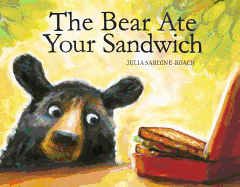
| Publisher: | Random House | |
| Genre: | Animals, Lifestyles, City & Town Life, Juvenile Fiction, Humorous Stories, Bears | |
| ISBN: | 9780375858604 | |
| Pub Date: | January 2015 | |
| Price: | $16.99 |
| Children's & Young Adult |
by Julia Sarcone-Roach
A missing sandwich leads to a shaggy dog, er, bear story with a surprise twist.
"By now I think you know what happened to your sandwich. But you may not know how it happened," says an offstage narrator. "It all started with the bear." A black bear, sleeping on the title page, rises on its hind legs, as if responding to the introductory remarks. Drawn by "the scent of ripe berries," the furry fellow stows away on a red pick-up truck. A three-part series of vignettes grow larger in size as the ursine hero climbs into the back, feasts and sleeps. The Golden Gate Bridge tells readers that the "high cliffs" rising up around him are the buildings of San Francisco. The forest there is "like nothing he'd ever seen before." Sarcone-Roach's palette feels timeless; the buildings match the truck, the cars and arched doorways match the sky, and the sun-kissed facades look golden. As the bear looks about in wonder, the farmer stares at the back of his red pick-up, scratching his head. Children will love knowing more than the bear does (and more than the sandwich owner), and the author's consistent hues throughout create a self-contained world.
As "leafy green smells led the bear to new fun," Sarcone-Roach shows a park with a slide, and "that is when he saw it./ Your beautiful and delicious sandwich. All alone." But alas, the thief has witnesses: an attentive pen of pups! After a few more turns, the ending delivers its final surprise. Did the bear eat the sandwich? --Jennifer M. Brown, children's editor, Shelf Awareness